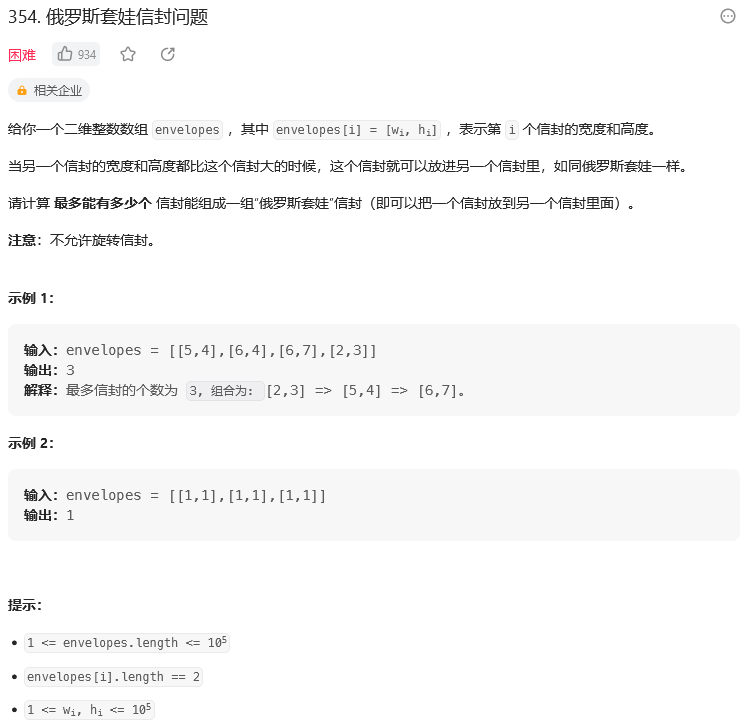354. 俄罗斯套娃信封问题
题目:

思路:
【1】这道题其实和 最长严格递增子序列 逻辑是一样的,所以其实可以参考 300. 最长递增子序列 这道题。
因为本质上 : 如数据 [[2, 100], [3, 200], [4, 300], [5, 250], [5, 400], [5, 500], [6, 360], [6, 370], [7, 380]] 你会发现你需要判断是否要选 [4, 300] 这个元素,如果你选了是否会截断后面的填充 后面填充的会不会更大,所以一般会采用辅助空间的方式来记录,能够连起来的数据。
代码展示:
//时间49 ms 击败 32.90% //内存92.8 MB 击败 89.29% class Solution { public int maxEnvelopes(int[][] envelopes) { if (envelopes.length == 0) { return 0; } int n = envelopes.length; Arrays.sort(envelopes, new Comparator<int[]>() { public int compare(int[] e1, int[] e2) { if (e1[0] != e2[0]) { return e1[0] - e2[0]; } else { return e2[1] - e1[1]; } } }); List<Integer> f = new ArrayList<Integer>(); f.add(envelopes[0][1]); for (int i = 1; i < n; ++i) { int num = envelopes[i][1]; if (num > f.get(f.size() - 1)) { f.add(num); } else { int index = binarySearch(f, num); f.set(index, num); } } return f.size(); } public int binarySearch(List<Integer> f, int target) { int low = 0, high = f.size() - 1; while (low < high) { int mid = (high - low) / 2 + low; if (f.get(mid) < target) { low = mid + 1; } else { high = mid; } } return low; } } //时间33 ms 击败 99.57% //内存93.6 MB 击败 69.34% class Solution { public int maxEnvelopes(int[][] envelopes) { int max = Integer.MIN_VALUE; int min = Integer.MAX_VALUE; for (int[] envelop : envelopes) { int val = envelop[0]; max = Math.max(max, val); min = Math.min(min, val); } int len = max - min + 1; PriorityQueue<Integer>[] queues = new PriorityQueue[len]; for (int[] envelop : envelopes) { int val = envelop[0] - min; if (queues[val] == null) { queues[val] = new PriorityQueue<Integer>((a, b) -> b - a); } queues[val].offer(envelop[1]); } int[] stack = new int[len]; int size = 0; int maxH = 0; for (PriorityQueue<Integer> queue : queues) { if (queue == null) { continue; } int val = 0; while (!queue.isEmpty() && queue.peek() > maxH) { val = queue.peek(); queue.poll(); } while (!queue.isEmpty() && queue.peek() == maxH) { queue.poll(); } if (val != 0) { stack[size++] = val; maxH = val; } int index = size; while (!queue.isEmpty()) { val = queue.poll(); if (index == 0) { stack[index] = val; continue; } index=binarySearch(stack, 0, index, val); stack[index] = val; if (index == size - 1) { maxH = val; } } } return size; } int binarySearch(int[] nums, int start, int end, int target) { while (start < end) { int mid = (start + end) >> 1; int midValue = nums[mid]; if (target == midValue) { start = mid; break; } else if (target < midValue) { end = mid; } else { start = mid + 1; } } return start; } }


 浙公网安备 33010602011771号
浙公网安备 33010602011771号